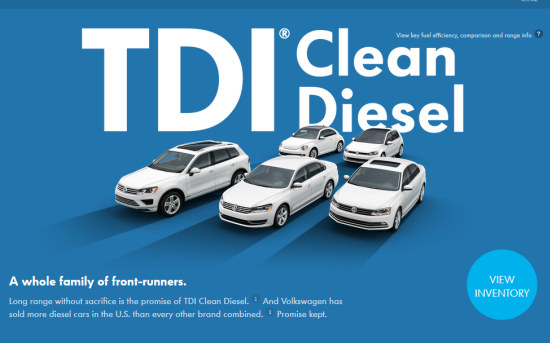By George Crowley ’16, Tech Desk Editor
The Volkswagen “Dieselgate” scandal has been all over the news lately, and I’m sure a lot of you have been wondering what it’s about. Essentially, Volkswagen had a line of 2.0l “clean” diesel engines that they sold in many of their cars on both the US and European markets. Especially in the US, where emissions regulations are slightly more stringent than in the EU, their engines were essentially the only small diesel engines available. Most other companies that sold cars with diesels only had the engines in trucks or larger cars. However, it turns out that Volkswagen’s dominance in terms of small diesel engines could not be explained simply by the prowess of German engineering—or perhaps it could. Volkswagen engineers put software into the engine control computers of their diesel cars that would recognize when the car was being tested for emissions, and de-tune the engine so it produced less power, but crucially, less pollutants. So essentially, the cars appeared clean when tested, but as soon as they got back on the road, they resumed spewing pollutants into the air. Because cars aren’t tested for power when they’re emissions- tested, no one caught on.
That is until recently, when researchers at West Virginia University found that Volkswagen diesels produced about 35-40 times the legal limit of Nitrous oxide, or Nox. The researchers were comparing a Volkswagen and a BMW, both fitted with diesel engines, but were only expecting to compare their emissions— not uncover cheating. Nitrous oxides can result in the formation of ozone, which leads to smog. Smog is a big problem in some states, California in particular; as California has a large hand in pollution laws, the standards for Nox emissions are correspondingly tight. Volkswagen has currently placed a hold on selling all diesel vehicles with the affected engines, and is in the process of recalling the affected cars. Volkswagen stock has already dropped significantly, but it is a very large company, so hopefully this scandal won’t be enough to bankrupt it.
In my opinion, while it was bad of Volkswagen to cheat and defraud the customer in such a way, this event calls for a large change in how we regulate pollution. Nitrous oxide levels in cars should be looked at a lot more closely, in fact perhaps the limit should be raised, to match the limit placed on trucks and larger vehicles, as certainly a smaller engine will still spew out less pollutants than that of a trucks. Running the engine in a “cleaner” mode is in fact less clean, and less efficient, so there is more soot build up in the engine, and the mileage decreases, meaning more fuel is burned to get places. Interestingly enough, it has also come to light that several other models of cars, both gas and diesel, from companies such as Mazda, BMW, and Citroen have higher than listen emissions, so it is very possible that the Volkswagen scandal is only the beginning of something much larger. However, most of these other models appear to be in the EU, where the demand for smaller engined cars is greater than the US, so these companies will likely take less of a hit here in the states. Most customers are outraged over this break of trust by Volkswagen, as clearly their vehicle will be devalued by it, and any “fix” applied will decrease their performance. Time will tell how this turns out for the auto industry, and Volkswagen in particular.
Sources:
https://en.wikipedia.org/wiki/Volkswagen_emissions_scandal
http://static.autoblog.nl/images/wp2015/VW-Clean-TDI-001.jpg



